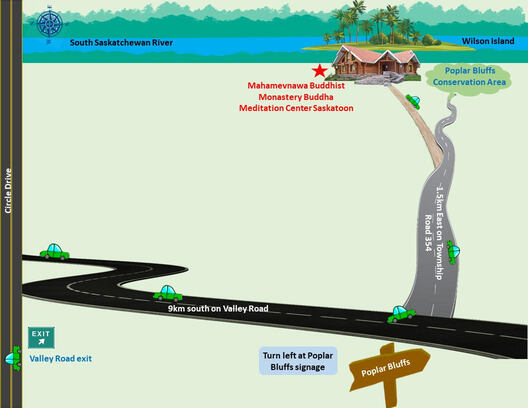Piyajātikasutta - Born from Those Who Are Dear
Namo Tassa Bhagavato Arahato Samma Sambuddhassa !
Homage to the Blessed One, the Worthy One, the Supremely Enlightened One !
Homage to the Blessed One, the Worthy One, the Supremely Enlightened One !
Once, when the Blessed One was living at Sāvatthī in Jeta's Grove, Anāthapiṇḍika's Park. Then the only son of a householder had died. The householder went to meet the Blessed One. The Blessed One said, "Householder, your faculties are not those of one in control of his own mind. Your faculties are deranged." "How could my faculties not be deranged, venerable sir, my dear and beloved only son has died?” "Householder! Sorrow, lamentation, pain, grief, and despair are born from those who are dear; arise from those who are dear.” "Venerable sir, who would think that sorrow, lamentation, pain, grief, and despair are born from those who are dear, arise from those who are dear? Happiness and joy are born from those who are dear; arise from those who are dear." Displeased with the Blessed One's words, he left. The householder went to those gamblers nearby and explained his conversation with the Blessed One. The gamblers said, “So it is, householder! Happiness and joy are born from those who are dear; arise from those who are dear. " Then the householder left thinking, "I agree with the gamblers."
Eventually this story reached the palace. Then King Pasenadi of Kosala told Queen Mallikā, "This is what has been said by the recluse Gotama, “Sorrow, lamentation, pain, grief, and despair are born from those who are dear; arise from those who are dear. " Mallika said, "If that has been said by the Blessed One, then it is so." King said, “Mallikā, no matter what the recluse Gotama says, you applaud it, thus, ‘If that has been said by the Blessed One, sire, then it is so.” Be off, Mallikā, away with you!" Then Queen Mallikā addressed the brahmin Nāḷijangha, "Come, brahmin, go to the Blessed One and pay homage in my name and then say this: ‘Venerable sir, have these words been uttered by the Blessed One, "Sorrow, lamentation, pain, grief, and despair are born from those who are dear, arise from those who are dear"?’ Learn well what the Blessed One replies and report it to me; for Tathāgatas do not speak untruth."
He went to the Blessed One, exchanged greetings with him and said, "Master Gotama, Queen Mallikā pays homage with her head at Master Gotama's feet and says this: ‘Venerable sir, have these words been spoken by the Blessed One, "Sorrow, lamentation, pain, grief, and despair are born from those who are dear, arise from those who are dear?” So it is, brahmin! Sorrow, lamentation, pain, grief, and despair are born from those who are dear; arise from those who are dear”. "It can be understood from this, brahmin, how sorrow, lamentation, pain, grief, and despair are born from those who are dear, arise from those who are dear. Once in the Sāvatthī there was a certain woman whose mother died. Owing to her mother's death, she went mad, lost her mind, and wandered from street to street and from crossroad to crossroad, saying, ‘Have you seen my mother?” “Once in the Sāvatthī there was a certain woman whose father died…whose brother died…whose sister died…whose son died…whose daughter died…whose husband died. Owing to her husband's death, ….” "And it can also be understood from this how sorrow, lamentation, pain, grief, and despair are born from those who are dear, arise from those who are dear. Once in the Sāvatthī there was a certain woman who went to live with her relatives’ family. Her relatives wanted to divorce her from her husband and give her to another whom she did not want. Then the woman said to her husband, ‘Lord, these relatives of mine want to divorce me from you and give me to another whom I do not want.’ Then the man cut the woman in two and disemboweled himself, thinking, ‘We shall be together in the after-life. ’ It can also be understood from this how sorrow, lamentation, pain, grief, and despair are born from those who are dear, arise from those who are dear." Delighting and rejoicing in the Blessed One's words, the brahmin Nāḷijangha went to Queen Mallikā, and reported to her his entire conversation with the Blessed One.
Then, Queen Mallikā went to King Pasenadi of Kosala and asked him, "What do you think, sire? Is Princess Vajīrī dear to you?" "Yes, Mallikā, Princess Vajīrī is dear to me." "What do you think, sire? If change and conversion took place in Princess Vajīrī, would sorrow, lamentation, pain, grief, and despair arise in you?" "Change and conversion in Princess Vajīrī would mean a conversion in my life. How could sorrow, lamentation, pain, grief, and despair not arise in me?" "It was with reference to this, sire, that the Blessed One who knows and sees, accomplished and fully enlightened, said, “Sorrow, lamentation, pain, grief, and despair are born from those who are dear, arise from those who are dear.”
“What do you think, sire? Is General Viḍūḍabha dear to you?……Am I dear to you?… Are Kāsi and Kosala dear to you?" "Yes, Mallikā, Kāsi and Kosala are dear to me. We owe it to Kāsi and Kosala that we use Kāsi sandalwood and wear garlands, scents, and unguents." "What do you think, sire? If change and conversion took place in Kāsi and Kosala, would sorrow, lamentation, pain, grief, and despair arise in you?" "Change and conversion in Kāsi and Kosala would mean a conversion in my life. How could sorrow, lamentation, pain, grief, and despair not arise in me?" "It was with reference to this, sire, that the Blessed One who knows and sees, accomplished and fully enlightened, said: ‘Sorrow, lamentation, pain, grief, and despair are born from those who are dear, arise from those who are dear.’
"It is wonderful, Mallikā, it is marvellous how far the Blessed One penetrates with wisdom and sees with wisdom! Come, Mallikā, give me the cleansing water."
Then King Pasenadi of Kosala rose from his seat, and arranging his upper robe on one shoulder, he extended his hands in reverential salutation towards the Blessed One and uttered this exclamation three times:
"Honour to the Blessed One, accomplished and fully enlightened!
"Honour to the Blessed One, accomplished and fully enlightened!
"Honour to the Blessed One, accomplished and fully enlightened!
Sādhu ! Sādhu !! Sādhu !!!
Namo Buddhaya!
Homage to the Supreme Buddha!
THE MIDDLE LENGTH DISCOURSES OF THE BUDDHA (MN 87)
May The Noble Triple Gem Bless You !
Eventually this story reached the palace. Then King Pasenadi of Kosala told Queen Mallikā, "This is what has been said by the recluse Gotama, “Sorrow, lamentation, pain, grief, and despair are born from those who are dear; arise from those who are dear. " Mallika said, "If that has been said by the Blessed One, then it is so." King said, “Mallikā, no matter what the recluse Gotama says, you applaud it, thus, ‘If that has been said by the Blessed One, sire, then it is so.” Be off, Mallikā, away with you!" Then Queen Mallikā addressed the brahmin Nāḷijangha, "Come, brahmin, go to the Blessed One and pay homage in my name and then say this: ‘Venerable sir, have these words been uttered by the Blessed One, "Sorrow, lamentation, pain, grief, and despair are born from those who are dear, arise from those who are dear"?’ Learn well what the Blessed One replies and report it to me; for Tathāgatas do not speak untruth."
He went to the Blessed One, exchanged greetings with him and said, "Master Gotama, Queen Mallikā pays homage with her head at Master Gotama's feet and says this: ‘Venerable sir, have these words been spoken by the Blessed One, "Sorrow, lamentation, pain, grief, and despair are born from those who are dear, arise from those who are dear?” So it is, brahmin! Sorrow, lamentation, pain, grief, and despair are born from those who are dear; arise from those who are dear”. "It can be understood from this, brahmin, how sorrow, lamentation, pain, grief, and despair are born from those who are dear, arise from those who are dear. Once in the Sāvatthī there was a certain woman whose mother died. Owing to her mother's death, she went mad, lost her mind, and wandered from street to street and from crossroad to crossroad, saying, ‘Have you seen my mother?” “Once in the Sāvatthī there was a certain woman whose father died…whose brother died…whose sister died…whose son died…whose daughter died…whose husband died. Owing to her husband's death, ….” "And it can also be understood from this how sorrow, lamentation, pain, grief, and despair are born from those who are dear, arise from those who are dear. Once in the Sāvatthī there was a certain woman who went to live with her relatives’ family. Her relatives wanted to divorce her from her husband and give her to another whom she did not want. Then the woman said to her husband, ‘Lord, these relatives of mine want to divorce me from you and give me to another whom I do not want.’ Then the man cut the woman in two and disemboweled himself, thinking, ‘We shall be together in the after-life. ’ It can also be understood from this how sorrow, lamentation, pain, grief, and despair are born from those who are dear, arise from those who are dear." Delighting and rejoicing in the Blessed One's words, the brahmin Nāḷijangha went to Queen Mallikā, and reported to her his entire conversation with the Blessed One.
Then, Queen Mallikā went to King Pasenadi of Kosala and asked him, "What do you think, sire? Is Princess Vajīrī dear to you?" "Yes, Mallikā, Princess Vajīrī is dear to me." "What do you think, sire? If change and conversion took place in Princess Vajīrī, would sorrow, lamentation, pain, grief, and despair arise in you?" "Change and conversion in Princess Vajīrī would mean a conversion in my life. How could sorrow, lamentation, pain, grief, and despair not arise in me?" "It was with reference to this, sire, that the Blessed One who knows and sees, accomplished and fully enlightened, said, “Sorrow, lamentation, pain, grief, and despair are born from those who are dear, arise from those who are dear.”
“What do you think, sire? Is General Viḍūḍabha dear to you?……Am I dear to you?… Are Kāsi and Kosala dear to you?" "Yes, Mallikā, Kāsi and Kosala are dear to me. We owe it to Kāsi and Kosala that we use Kāsi sandalwood and wear garlands, scents, and unguents." "What do you think, sire? If change and conversion took place in Kāsi and Kosala, would sorrow, lamentation, pain, grief, and despair arise in you?" "Change and conversion in Kāsi and Kosala would mean a conversion in my life. How could sorrow, lamentation, pain, grief, and despair not arise in me?" "It was with reference to this, sire, that the Blessed One who knows and sees, accomplished and fully enlightened, said: ‘Sorrow, lamentation, pain, grief, and despair are born from those who are dear, arise from those who are dear.’
"It is wonderful, Mallikā, it is marvellous how far the Blessed One penetrates with wisdom and sees with wisdom! Come, Mallikā, give me the cleansing water."
Then King Pasenadi of Kosala rose from his seat, and arranging his upper robe on one shoulder, he extended his hands in reverential salutation towards the Blessed One and uttered this exclamation three times:
"Honour to the Blessed One, accomplished and fully enlightened!
"Honour to the Blessed One, accomplished and fully enlightened!
"Honour to the Blessed One, accomplished and fully enlightened!
Sādhu ! Sādhu !! Sādhu !!!
Namo Buddhaya!
Homage to the Supreme Buddha!
THE MIDDLE LENGTH DISCOURSES OF THE BUDDHA (MN 87)
May The Noble Triple Gem Bless You !


